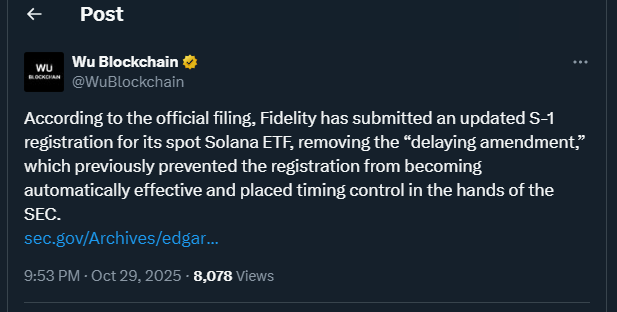TL;DR
- Fidelity has submitted updated final documentation to the SEC for its planned Spot Solana ETF, including a full staking approach and temporary fee waiver to attract early investors.
- The proposal arrives as Solana-based funds in the United States show strong institutional demand and growing inflows.
- If approved, the ETF would provide regulated exposure to SOL with staking-based yield, potentially positioning Solana as a core asset in digital portfolios.
Fidelity Investments is advancing toward the launch of its Spot Solana ETF in the United States. The asset manager filed finalized documents with the Securities and Exchange Commission, reinforcing its intention to offer a regulated product that mirrors real network participation while opening Solana access to retail and institutional investors. The updated filing details the fund’s framework, including staking mechanics, fees, and operational controls, strengthening the case for mainstream exposure to the Solana ecosystem.
The proposal includes the ability to stake a portion of the ETF’s SOL holdings to enhance returns for investors. Fidelity plans to waive the annual management fee during the initial launch period to encourage early adoption. The fund, expected to trade under ticker FSOL, aims to support settlement in either SOL or cash through authorized participants experienced in digital asset markets. Trading firms such as Cumberland DRW and Jane Street are anticipated to provide liquidity and execution support.
Rise Of Staking Focused Solana Funds
The timing of Fidelity’s filing follows a noticeable rise in demand for Solana investment products. Recent U.S. launches from Bitwise and Grayscale attracted millions in early inflows, reflecting greater interest in high-performance blockchain exposure. Bitwise chose a full-staking model for its Solana ETF, while Grayscale entered by converting a trust into a listed fund with active staking, adding more diversity for investors seeking yield, liquidity, and regulated alternatives.
Institutions increasingly view Solana as complementary to Ethereum, not merely a competitor. Solana’s strengths in high throughput, low transaction costs, and developer adoption across DeFi and consumer applications continue to gain attention. Supporters argue that regulated Solana products help the network be assessed on performance, reliability, and utility, moving market perception beyond short-term speculation.

Institutional Momentum Shapes A New Market Phase
Analysts believe regulated Solana funds could reshape crypto portfolio allocation, similar to the impact Bitcoin and Ethereum ETFs had on their markets. Early projections suggest Spot Solana ETFs in the U.S. could attract billions in inflows over the next year if market conditions remain favorable and network liquidity strengthens. Global interest is also expanding, with Hong Kong recently enabling trading of a Spot Solana fund with a low entry threshold.











